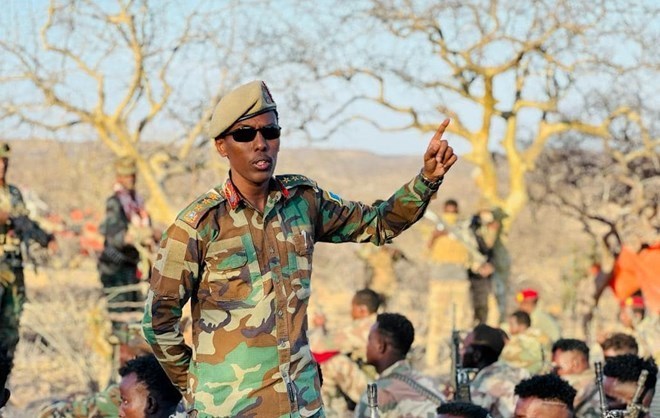
Monday September 19, 2022

Mogadishu (HOL) - The Chief of the Somali National Army, Odowa Yusuf Rage, said that 75 Al Shabaab militants were killed by the military and anti-Al Shabaab militias in the Hiiraan region during the battle to take Yaasooman village over the weekend.
Rage told Somali state media on Monday that "dozens of prisoners" were arrested and security forces confiscated equipment and guns during the operation, which is still underway.
"The army sacrificed their lives, comfort and family bonds to free our country," he added.
The state-owned television showed dozens of dead bodies of the militants, guns and military ammunition in the battle.
According to Reuters, a government-backed Somali militia killed at least 45 al-Shabab fighters and beheaded some of them on Sunday.
The general last publicly visited soldiers on the frontlines in Hiiraan in late August, where he urged residents from the newly liberated towns to work with the government to ensure the area does not fall back into Al Shabaab hands.
The commander of the national infantry troops, General Mohamed Tahlil Bihi, credited the mobilization of local tribes against Al Shabaab in central and south-central Somalia for turning the tide against the Al Qaeda-linked militant insurgency.
"This popular revolution is what made our most recent military campaign successful. It must continue, and we firmly support it "Bihi added.
The Somali military said they had taken at least 30 villages back from al Shabaab during the most recent offensive, which began earlier in the summer.
The Somali government estimates that at least 200 al Shabaab fighters were killed and another 100 seriously injured during intense fighting over the last several weeks.
Security analysts anticipate that with continued support from local militias in securing and clearing villages, Somalia's special forces can exert pressure on al Shabaab-administered areas, such as Buq aqable, which has been an al Shabaab stronghold for at least ten years.
However, to effectively hold the newly-liberated territory, security experts say federal and local authorities must be able to bring about real and lasting improvements in governance and security.